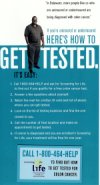Current Suspected Overdose Deaths in Delaware for 2025: Get Help Now!
Find school water testing results and additional resources
Attention Medicaid Participants: Eligibility Renewals Restarted April 1, 2023
Colon cancer is cancer in parts of the body including the colon, rectum, appendix and anus. It is also called "colorectal" cancer. The colon is a muscular tube about five feet long that is responsible for getting water and nutrients from food. Cancer happens when the cells in your body grow too fast or too much, creating a tumor which spreads to other tissues in the area. Most colon cancers develop from polyps, which are lumps of tissue in the bowel that could become cancer if not removed.

Colon cancer can be stopped! With screening tests, doctors can detect and even remove polyps and early cancers — that's why it is so important to get tested.
A Harvard Center for Cancer Prevention report estimated that close to half of all colon cancers in the United States could be prevented by healthy lifestyle habits and regular screenings. What can you do to help prevent colorectal cancer?
Most colon cancers begin as polyps, which are pre-cancerous lumps growing on the lining of colon wall. Regular screening can detect and remove these polyps before they become cancerous.
Colon cancer affects men and women of all ages and races, but people 50 years old or older are more likely to get colon cancer.
Most of the time, there are no visible symptoms. That's another reason why it is so important to get tested. However, there are a few symptoms that are noticeable:
A colonoscopy is the preferred test to detect colon cancer. A colonoscopy is a way to see if the tissue in your colon is normal or if there are any signs of cancer. Doctors use a colonoscope — a long, flexible, narrow tube with a light and a camera at the end — to check the lining of your bowel. You will receive anesthesia, so you won't feel anything. Biopsies (small tissue samples) may be taken while you're undergoing the test. Polyps (lumps of tissue in your bowel) may be removed during the test. Polyps can become cancer if they are not removed.
The test is a lot easier than you may think. It is not painful and takes about an hour. Here's what to expect: